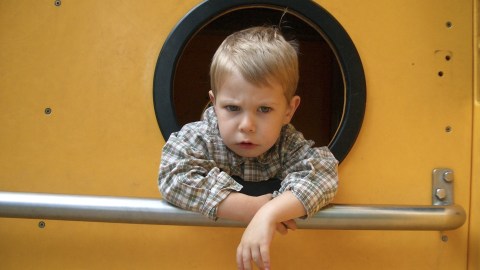Lying to your kids could make them more dishonest and less well-adjusted as adults

Stefan Klein/ullstein bild via Getty Images
Telling white lies to children can be somewhat par for the course when you’re a parent: “I’ve got Santa on the phone and he says he’s not coming unless you go to bed now,” is particularly useful during the festive season, for example.
It can seem like nothing: just another tool to improve your child’s behavior. But don’t get too attached to the technique — telling too many white lies to your children may have more far-reaching consequences than you might have hoped, according to a new study, published in the Journal of Experimental Child Psychology.
To examine the impact of parental lying, Peipei Setoh from Nanyang Technological University, Singapore, and colleagues gave 379 Singaporean adults four online questionnaires. First, in the “parenting by lying” questionnaire, participants were asked to recall whether or not their parents had told them various lies during childhood. This 16-item test covers four categories of lies: lies about food, lies about leaving or staying (e.g. “if you don’t come with me now I’ll leave you here”), lies about misbehavior and lies about spending money.
Next, the participants filled in the “lying to parents” questionnaire, indicating how frequently they themselves now lie to their parents as adults. Three categories were examined: lies concerning “activities and actions” they had taken part in, such as the details of relationships or friendships, “prosocial lies”, in which they had lied to benefit others, and exaggerations about events.
Finally, they took part in a longer questionnaire, which included questions on psychological and social dysfunctions such as problems with thought, attention, aggression, and rule-breaking. They also completed the Levenson self-report psychopathy test, which examines psychopathic traits such as selfishness and impulsivity.
The results suggested that those whose parents had lied more were now more likely to lie to their own parents — by being lied to, in other words, it seemed they had started to believe that being dishonest was morally acceptable. Parental dishonesty may also have eroded trust, the team suggests: By being lied to, children stop trusting their parents and would therefore be less likely to feel obligated to tell them the truth. Participants who were lied to more frequently in childhood were also more likely to have higher levels of maladjustment as adults, particularly when it came to “externalizing” problems like aggression.
There are, however, questions about whether the causal inference is as straightforward as it seems. If parents are constantly lying to their children, for example, there may potentially be other underlying relational issues contributing to problems in adolescence and adulthood. Yes, misleading children might not help their development, but there may also be deeper problems that are responsible for their difficulties with attention or behavior. Participants were also being asked to recall childhood experiences, of which they may have limited memory; subsequent family rifts, deaths, or estrangements may also have impacted their view.
Nevertheless, next time you think about telling what you see as a harmless white lie to keep your child quiet or get them into bed, think again. It may save you some time — but, in the long run, it’s probably not worth it.
– Parenting by lying in childhood is associated with negative developmental outcomes in adulthood
Emily Reynolds (@rey_z) is a staff writer at BPS Research Digest.
Reprinted with permission of The British Psychological Society. Read the original article.





